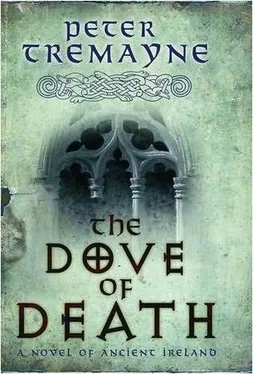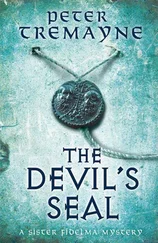Peter Tremayne - The Dove of Death
Здесь есть возможность читать онлайн «Peter Tremayne - The Dove of Death» весь текст электронной книги совершенно бесплатно (целиком полную версию без сокращений). В некоторых случаях можно слушать аудио, скачать через торрент в формате fb2 и присутствует краткое содержание. Жанр: Исторический детектив, на английском языке. Описание произведения, (предисловие) а так же отзывы посетителей доступны на портале библиотеки ЛибКат.
- Название:The Dove of Death
- Автор:
- Жанр:
- Год:неизвестен
- ISBN:нет данных
- Рейтинг книги:5 / 5. Голосов: 1
-
Избранное:Добавить в избранное
- Отзывы:
-
Ваша оценка:
- 100
- 1
- 2
- 3
- 4
- 5
The Dove of Death: краткое содержание, описание и аннотация
Предлагаем к чтению аннотацию, описание, краткое содержание или предисловие (зависит от того, что написал сам автор книги «The Dove of Death»). Если вы не нашли необходимую информацию о книге — напишите в комментариях, мы постараемся отыскать её.
The Dove of Death — читать онлайн бесплатно полную книгу (весь текст) целиком
Ниже представлен текст книги, разбитый по страницам. Система сохранения места последней прочитанной страницы, позволяет с удобством читать онлайн бесплатно книгу «The Dove of Death», без необходимости каждый раз заново искать на чём Вы остановились. Поставьте закладку, и сможете в любой момент перейти на страницу, на которой закончили чтение.
Интервал:
Закладка:
An elderly man with slightly stooped shoulders sat just in front and below King Alain. He was the bretat Kaourentin of Bro-Gernev who had arrived to be the impartial judge of the proceedings. He did not inspire confidence in Fidelma. He was a thin-faced man, with a pale complexion, a beak of a nose and a look of permanent disapproval on his features. His long, once-fair hair was a dirty white, tied at the back of his neck with a ribbon. Fidelma sat directly opposite him, with Brother Metellus at her side as translator. On Metellus’ other side was Eadulf, then Bleidbara and Heraclius, their bench being slightly to the right of the elderly judge and thus opposite Riwanon and Budic. Facing Alain and Lord Canao, on the first bench sat Macliau, stubborn-looking, his chin held aggressively high, like a child about to be censured by its father. By his side was his sister Trifina, slouched on her seat with melancholy eyes downcast.
Behind them, all the other benches were filled. Among the people crowded there Fidelma had spotted Barbatil, the farmer and father of Argantken, Coric his friend, and the elderly Aourken. At the back was Hoel, now elevated to captain of the Barnacle Goose , with Wenbrit the cabin boy and other members of the crew. Fidelma presumed that the rest of the crowd consisted of local people and members of the community of the abbey. At strategic points around the hall were warriors of the King’s bodyguard, together with some of the warriors of Brilhag led by Boric.
There was a suppressed excitement in the great hall. The murmurs rose and then gradually died as Alain Hir cleared his throat. He opened with a few words in his native language, phrasing them in a rich baritone that commanded people’s immediate attention. Then he switched easily into Latin.
‘My friends, since the language common to most of us is Latin then I enjoin you to use it. For those who do not possess knowledge of it, your friends will know who you are. Please will those friends go and sit beside you now — in order to translate, so that you may understand what is being said. I make this special concession in this hearing due to the fact that we have a foreigner among us who will make a plea before us, and, not being proficient in our language, will do so in Latin.’
Fidelma was about to rise when the old judge, Kaourentin, did so quickly and half-turned to acknowledge the King.
‘I have to speak for the law we share among our kingdoms and over which you, Alain Hir, preside.’ His voice was dry and rasping. ‘It is a custom and has been observed from time immemorial that no foreign person, especially one unable to speak our language, may plead before our judges, let alone in the capacity of a prosecutor. I raised this matter with you last night when, after my arrival, the nature of this case was explained,’ he added reproachfully.
Alain the Tall gazed down at him.
‘You made your point eloquently last night and I have weighed your words most carefully. However, I have decided, in the exceptional circumstances which face us, to allow Fidelma of Hibernia to state why she should be allowed to speak here.’ He raised a hand to silence the judge, who was clearly about to make further objections.
Fidelma now rose and smiled quickly at the King. Then she took out the hazel wand of office, the wand of a techtaire or ambassador, that she had been carrying ever since she had picked it up from the deck of the Barnacle Goose , where it had fallen from Bressal’s nerveless fingers.
‘This is the symbol of office of an ambassador, which the people of Hibernia hold sacred, and which sacred office was violated. It fell from the hand of Bressal, who came to you in peace. He came to conclude a treaty with your kingdom and mine. As sister to my brother, Colgú, King of Muman in the land of Hibernia, I now pick it up and claim that role.’
‘Your rank and position are recognised here,’ conceded King Alain.
‘Your courtesy is only exceeded by your wisdom, Alain, King of the Bretons,’ she replied. ‘I thank you. Let me make it plain that I am not here to prosecute in your court. I am an advocate of the laws of my country but that does not give me the knowledge to plead in your laws, which I freely admit remain unknown to me. What I would wish is to be allowed to present to those gathered here some facts. Should they be accepted and it is felt that there is a charge to be answered under your laws, I merely hand these facts to you. To you , Kaourentin, so that you may pursue them to a logical conclusion within the constraints of your law.’
The elderly man gazed at her with his dark suspicious eyes.
‘These facts that you have gathered by means of investigation — did this involve the questioning of people?’
‘Yes, of course.’
‘What authority had you to do so?’ Kaourentin smiled thinly. ‘Again, it is our law that no foreigner can come into our kingdoms and use subterfuge and guile to extract information to present for legal use.’
‘Subterfuge and guile? That is a strange way of putting it,’ Fidelma observed.
‘A law nevertheless. So you admit that you have no authority to have made such an investigation?’
‘I did not concede that I had no authority to do so.’ Fidelma glanced meaningfully at Riwanon, who flushed slightly.
‘She acted under my authority, I think,’ the wife of Alain Hir announced.
Kaourentin, his brows drawn, turned to her. ‘You say that you think she acted on your authority? How is this?’
‘I told her to find out who killed Abbot Maelcar.’
‘Hah!’ Kaourentin exclaimed. ‘May I remind you that the charge against Macliau, son of Lord Canao, is that he murdered the girl called Argantken?’
‘The charge is further that he is the person behind the Koulm ar Maro , the sea raiders, and thereby responsible for all the deaths that occurred here,’ Fidelma reminded him.
‘The Queen has said that she told you only to find out who killed Abbot Maelcar,’ quibbled the bretat .
‘If it makes it clearer, Riwanon reiterated her authority on the very morning Ceingar was killed and when Trifina and Iuna were abducted, which authority included the other deaths,’ Fidelma told the old judge calmly, but wondered whether he was being pedantic or obstructive. ‘The words used in front of Budic and of Eadulf were that I had “complete authority” to do so.’
King Alain made an irritated sound and bent forward.
‘My wife has explained this, Kaourentin. If that is not enough, then her authority is now confirmed by my own authority for, my wife in our law, always acts under my name.’ He spoke sharply, clearly annoyed by this legal attempt to stop Fidelma speaking after he had given his permission for her to do so.
‘Forgive me, sire.’ Kaourentin was bowing to him. His voice was suave. ‘It is my duty to instruct in the law and ensure that all is done according to its principles.’
‘Having done so,’ King Alain replied in a heavy tone, ‘may we finally proceed?’
Kaourentin inclined his head and, sitting down, added: ‘Speak, Fidelma of Hibernia. But remember that the primary reason we are gathered here is to hear the case against Macliau, son of Lord Canao, and consider his defence.’
Fidelma allowed the ripple of voices to spread through the great hall and eventually die away. She liked to concentrate her mind for a few moments when she was about to present a case before the Brehons of her own country. She realised that she would be limited in what she had to claim, since she had none of the legal supports of her own laws to back her. She was not even sure that she would be able to cross-examine any of the people she wanted to. But for the sake of justice she had to pursue this course with all the eloquence that she could command. It was her duty.
Читать дальшеИнтервал:
Закладка:
Похожие книги на «The Dove of Death»
Представляем Вашему вниманию похожие книги на «The Dove of Death» списком для выбора. Мы отобрали схожую по названию и смыслу литературу в надежде предоставить читателям больше вариантов отыскать новые, интересные, ещё непрочитанные произведения.
Обсуждение, отзывы о книге «The Dove of Death» и просто собственные мнения читателей. Оставьте ваши комментарии, напишите, что Вы думаете о произведении, его смысле или главных героях. Укажите что конкретно понравилось, а что нет, и почему Вы так считаете.











